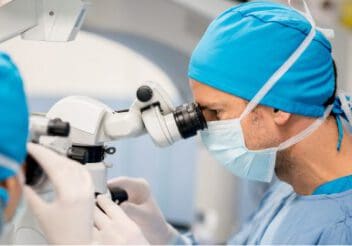
Medically Reviewed by Angelique J. Pillar, M.D. NVISION Surgeon
Is It Common to Have a Headache After Cataract Surgery?
Home / Guide to Cataract Surgery /
Last Updated:

Medically Reviewed by Angelique J. Pillar, M.D. NVISION Surgeon
A headache is not a typical complication of cataract surgery. You are not likely to experience one as a result of the operation.
It is common to experience discomfort and pain for a short time after cataract surgery, however.
A headache after cataract surgery can be the result of dry eyes, vision issues, or general eye pain. It is usually mild and can be managed with over-the-counter medications. Sometimes headaches can also be a result of fasting prior to the surgery or a headache as a response to the anesthesia given during cataract surgery.
There have been cases of cataract surgery potentially causing cluster headaches, which are very intense and difficult to manage. If you experience severe headaches, migraines, or cluster headaches after cataract surgery, it is important to talk to your doctor right away.
Reasons for Headaches After Cataract Surgery

Cataract surgery and cataracts themselves are unlikely to cause headaches. A cataract is a clouding of the lens that can impact vision. Impaired vision can cause things like eye strain and squinting that can lead to headaches and discomfort.
Side effects of cataract surgery can include the following:
You deserve clear vision. We can help.
With 135+ locations and over 2.5 million procedures performed, our board-certified eye surgeons deliver results you can trust.
Your journey to better vision starts here.
- Redness
- Swelling
- Blurry vision
- Seeing halos or glares around lights
- Pain
Typically, the pain, swelling, and redness that can occur after cataract surgery go away in a few days to a couple weeks after the operation. Discomfort and pain in and around the eye and site of the incision can feel like a headache. This can usually be managed with an over-the-counter analgesic medication and/or anti-inflammatory eye drops.
Headaches after cataract surgery are not common, but it is possible to experience discomfort and eye pain. This discomfort is usually not cause for concern and can be taken care of easily at home.
Cluster Headaches After Cataract Surgery
A potential cause of the onset of cluster headaches is cataract surgery, case reports indicate. This is because during cataract surgery, the cornea must be cut in order to remove the cloudy lens. The cutting of the cornea can then cause a trigeminal-autonomic reflex, which is a possible trigger for cluster headaches.
There is no known specific cause of cluster headaches, which are intense, severe, and debilitating. The American Migraine Foundation lists cluster headaches as some of the most excruciating types of headaches to suffer from. Cluster headaches happen in groups, or “clusters,” of between one and eight attacks, lasting between 15 minutes to 3 hours per day.
Cluster headaches can have the following symptoms:
- Stabbing pain on one side of the head or behind the eye
- Redness of the eye and tearing on the side of the head where the pain is
- Sweating and flushing of the face
- A stuffy or runny nostril on the side of the head where the pain is
- Drooping eyelid and constricted (smaller) pupil
- Nausea
- Agitation
- Sensitivity to light
You can suffer these cluster attacks daily for several weeks or months and then get a reprieve, as they can go into remission for months or even years. There are specialized treatments to manage the symptoms of cluster headaches and preventative measures you can take.
Cluster headaches are a serious condition. Medical intervention is needed to treat and diagnose the issue.
When to Seek Medical Attention

It is normal to experience some discomfort, swelling, redness, irritation, and vision clarity issues right after cataract surgery. Generally, your vision will clear, and symptoms will start to improve within hours after the surgery. It can take up to four to six weeks for your eye to heal completely from the operation and for vision to stabilize.
Major complications from cataract surgery are rare. Most people, 9 out of 10, see better and are happy with the results of cataract surgery.
If you experience any of the following after a cataract surgery, you need to talk to your doctor right away:
- Vision loss or declining vision
- Pain that cannot be managed with over-the-counter medications or pain that is persistent and significant
- Floaters or “spots” in your field of vision
- Increasing redness
- Swelling that does not go down and/or gets worse
It is common to experience a moderate level of pain after cataract surgery, but most of the time, it will get better after discharge, within the first 24 hours. It will then continue to improve over the next few days and weeks.
If you experience severe pain or a debilitating headache after cataract surgery, seek immediate medical attention and let your ophthalmologist know as soon as possible.
You deserve clear vision. We can help.
With 135+ locations and over 2.5 million procedures performed, our board-certified eye surgeons deliver results you can trust.
Your journey to better vision starts here.
References
- Can Cataracts Cause Headaches? (October 2018). American Academy of Ophthalmology (AAO).
- Cataract Surgery. (September 2020). American Academy of Ophthalmology (AAO).
- Cluster Headache After Cataract Surgery. (November 2013). Clinical Journal of Pain.
- Navigating the Symptoms & Treatments for Cluster Headaches. (April 2019). American Migraine Foundation.
- Cataracts. (August 2019). National Eye Institute (NEI).
- A Prospective Study on Postoperative Pain After Cataract Surgery. (July 2013). Clinical Ophthalmology.

Angelique J. Pillar, MD is a fellowship trained and board certified ophthalmologist specializing in cataract, cornea, and refractive surgery.
This content is for informational purposes only. It may have been reviewed by a licensed physician, but is not intended to serve as a substitute for professional medical advice. Always consult your healthcare provider with any health concerns. For more, read our Privacy Policy and Editorial Policy.
